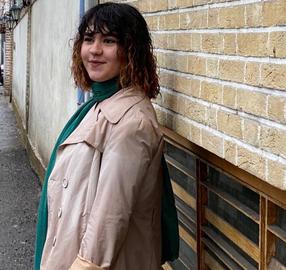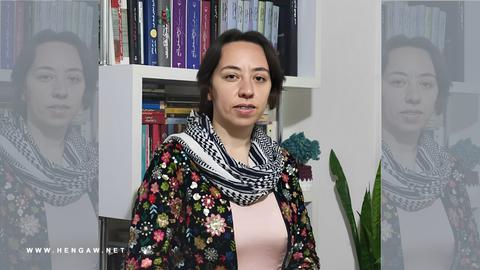Fatemeh Baraghani Qazvini, known as Tahereh Qurrat al-Ayn, was born to a religious family in Qazvin, 150 kilometers north-west of Tehran, between 1814 and 1817. Her father and uncle were well-known Shia clerics in Qazvin who bequeathed the city with a large mosque and a school named Salehieh. Their descendants remain prominent figures in Qazvin.
Qurrat al-Ayn was educated by her father but she learned about poetry and literature from her mother. She took part in discussions at school and during family gatherings, surprising and impressing those attending with her knowledge. Whenever she read or heard a poem she liked, she would write it down and use it in her conversations. She was very articulate and the short notes and poems she left behind show her impressive mastery of Persian literature.
She married a cousin of hers who was Qazvin’s Friday Imam when she was a teenager and the couple had three children. But a rift developed between them over her adherence to Sheikhism, a Shia school that believes in intermediaries between the people and Mahdi, the 12th Shia Imam.
Religious authorities have accused followers of Sheikhism of heresy. Tahereh’s husband and his father Sheikh Mohammad Taghi were unwavering opponents of Sheikhism, while another uncle of hers supported this school of thought and maintained good relations with her.
Tahereh secretly corresponded with Kazim Rashti, successor to Sheikh Ahmad, the founder of Sheikhism. Rashti lived in the Shia holy city of Karbala in present-day Iraq, which was at the time a province of the Ottoman Empire. In the early 1840s, after her divorce, Tahereh traveled to Karbala to meet him but he died a few days before her arrival.
In 1844, while in Karbala, she became acquainted with the teachings of Seyed Mohammad Ali Shirazi, the founder of Babism who later took the title Tahereh Bab (“Pure Gate”), and converted to Babism. Babism was also a messianic movement and Bab claimed to be a messenger of God and a “gate” to the re-emergence of the 12th Shia Imam.
She never met Bab but enthusiastically traveled to many places to proselytize Babism. Her activities drew the ire of Shia believers, their leaders and the authorities of the Ottoman Empire. The people of Karbala stoned her home and the city’s governor exiled her to Baghdad, where Tahereh continued to proselytize actively. She was arrested and was exiled to Iran.
Her former father-in-law Sheikh Mohammad Taghi and family members were steadfast opponents of Babism, and Sheikh Mohammed, Qazvin’s high religious authority, ordered the suppression of its followers.
One day, as Sheikh Mohammad Taghi was praying in a mosque, he was assassinated by a Babi named Mirza Abdollah. Tahereh’s ex-husband claimed she had ordered the assassination. Qazvin’s governor put Tahereh in prison, but she escaped with the help of a guard and went to Tehran.
In June 1848, as the suppression of the Babi’s intensified, Tahereh gathered around 80 Babis for a conference in the village of Badasht near Shahroud, a city in the north-eastern province of Semnan. Qurrat al-Ayn appeared at the conference without a headscarf, in defiance of tradition and the religious dress code for women. In her speech, she declared that Babis could no longer abide by the edicts of Islam and that Babism must be considered a separate religion.
Historians believe that Qurrat al-Ayn was the first Babi woman to remove her hijab in public. She believed that women must engage in society and have equal rights with men, an idea that was unheard of in 19th century Iran.
The Badasht conference led to clashes between government agents and Babis. Tahereh lived in hiding for some time until her arrest on the charge of ordering the assassination of her father-in-law. She was kept in detention at the home of Tehran’s police chief for three years. In the meantime Bab was executed and, to avenge his death, Babis made an attempt on the life of Naser al-Din Shah Qajar, the reigning monarch. The king ordered the massacre of all Babis after the assassination attempt.
One account says that Naser al-Din Shah, who met Qurrat al-Ayn at the start of her detention, wrote her a letter in which he said he would take her as a wife and that she would be granted a high position in his harem if she rejected Babism. According to this story, she rejected the king’s offer and requested a visit with him. According to some historical sources, the courtiers were afraid that the king would be impressed by Qurrat al-Ayn’s beauty and eloquence and took the decision to precipitate her trial.
Qurrat al-Ayn is said to be the first Iranian woman to have been executed for “corruption on Earth,” a charge that the Islamic Republic has regularly invoked against its opponents, critics and even protesters before putting them to death. Male Babi leaders were executed in public, while Tahereh Qurrat al-Ayn’s execution was secretly carried out in the dead of the night in Tehran’s Ilkhani Garden. She was strangled with her own veil in August 1852, her body was thrown in a shallow well which was filled with earth and stones. She was only 35 years old.
Besides her religious activities, Tahereh was a pioneer advocate of women's rights in Iran. Reportedly, her last words were "You can kill me as soon as you like, but you cannot stop the emancipation of women.”
visit the accountability section
In this section of Iran Wire, you can contact the officials and launch your campaign for various problems
























comments